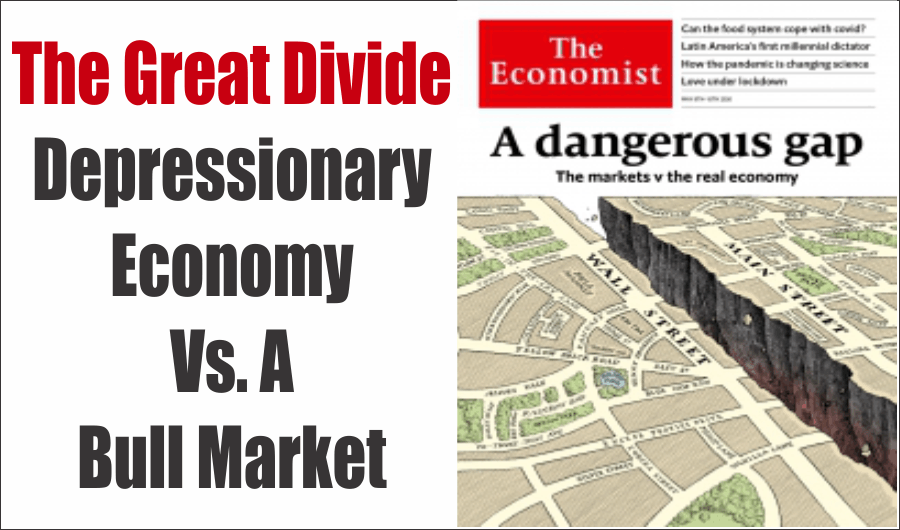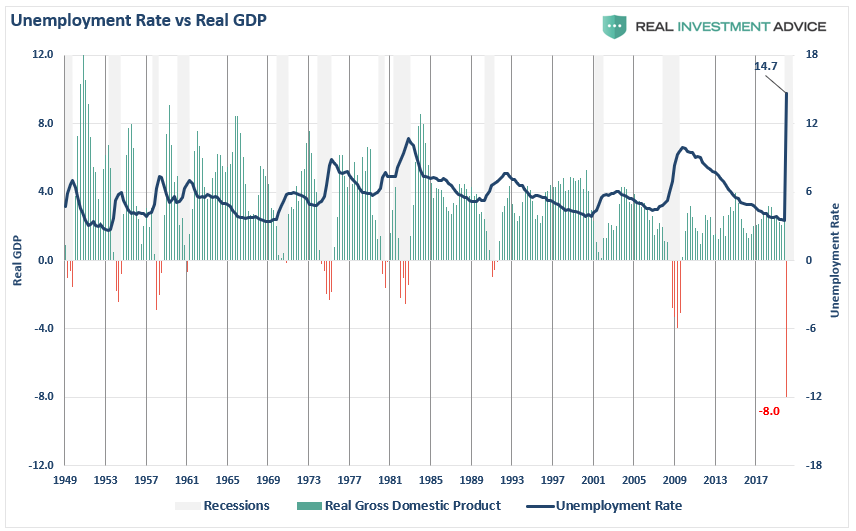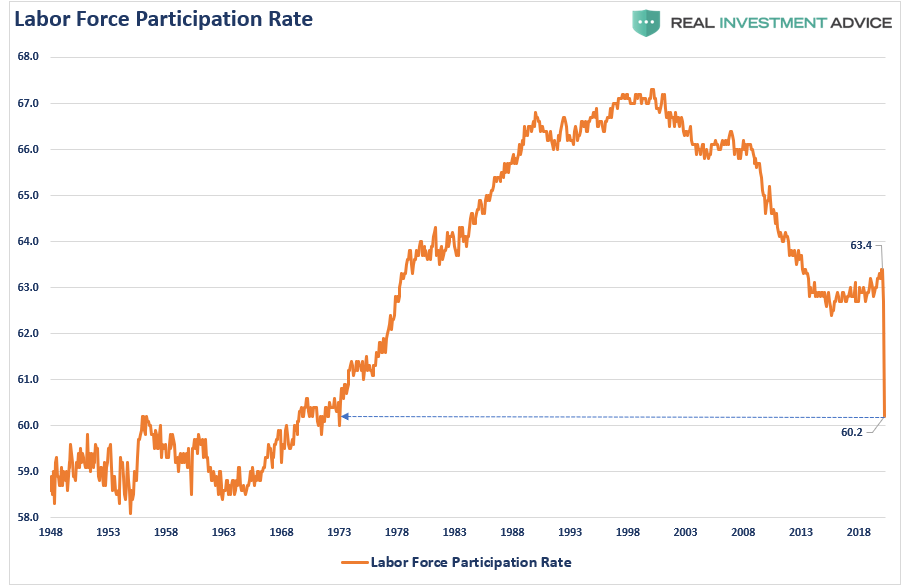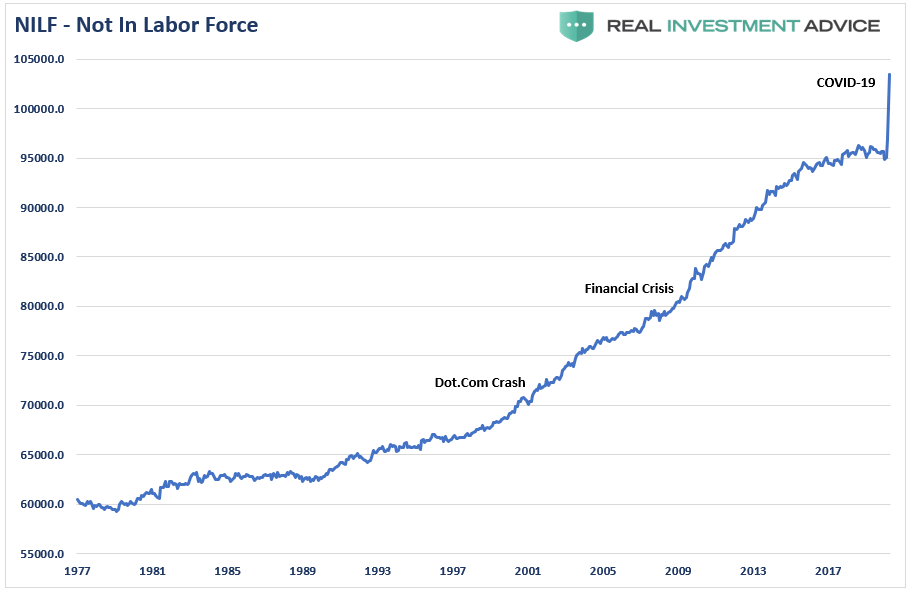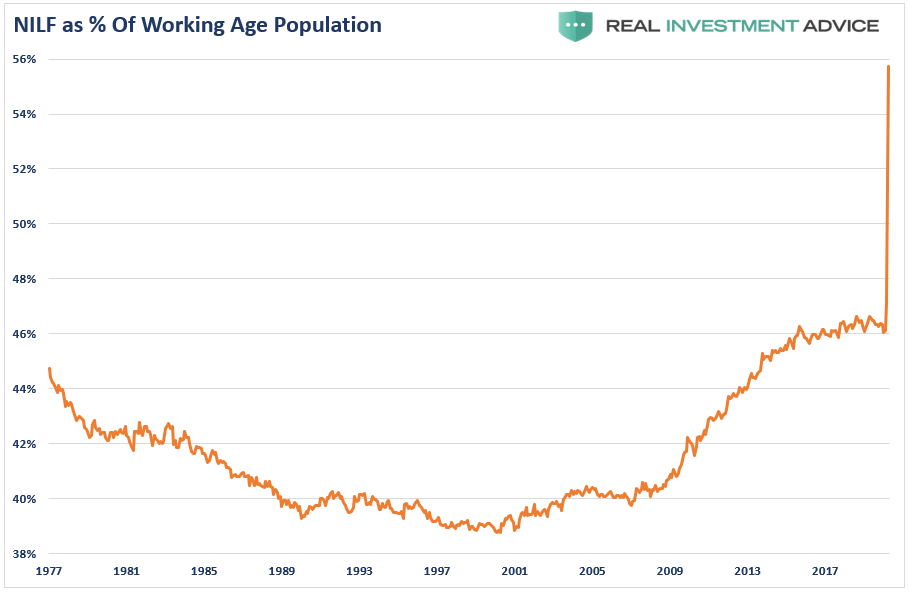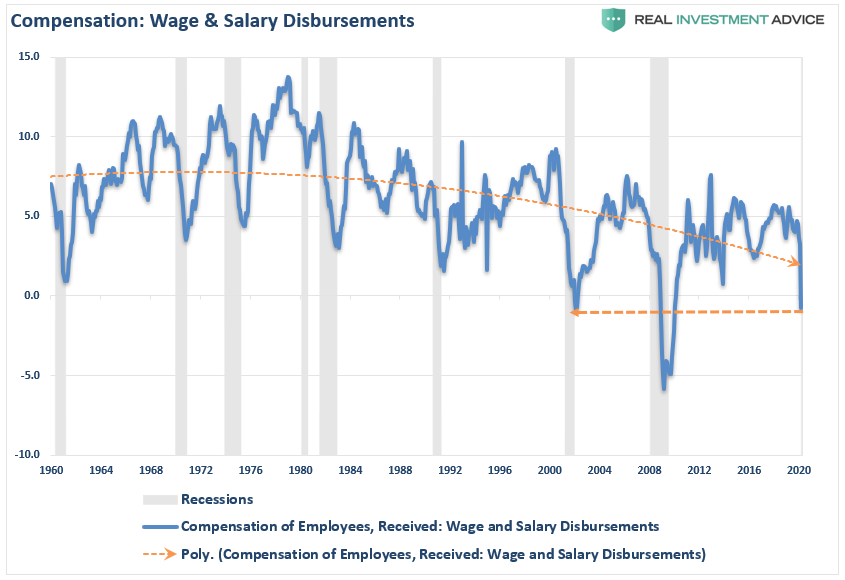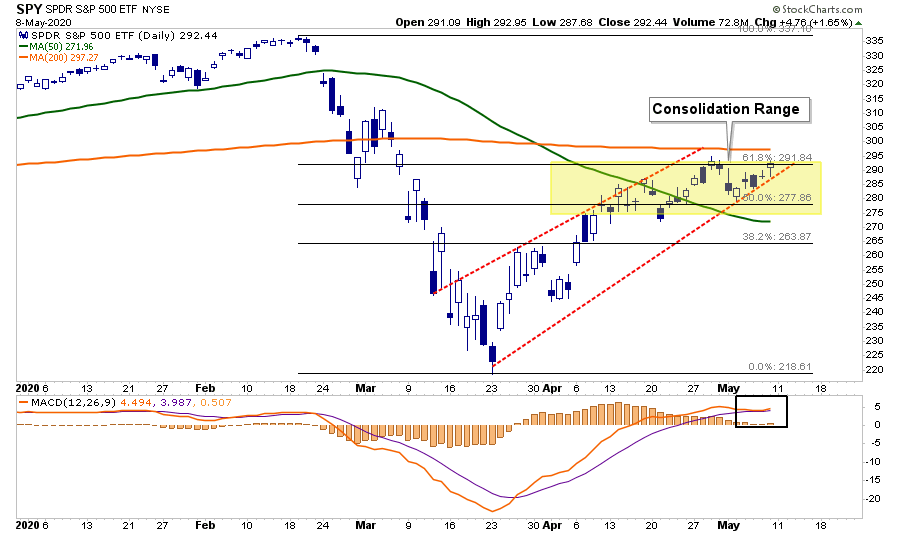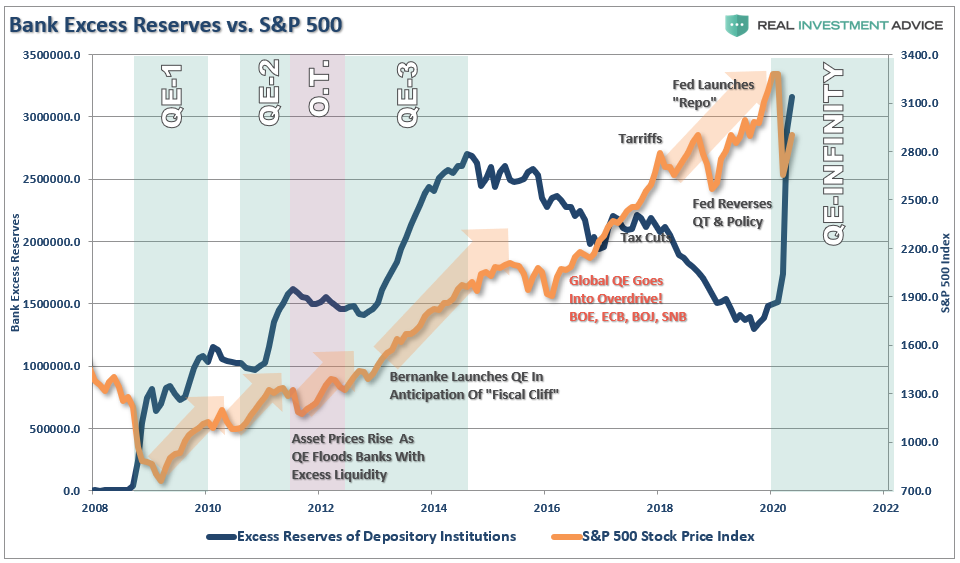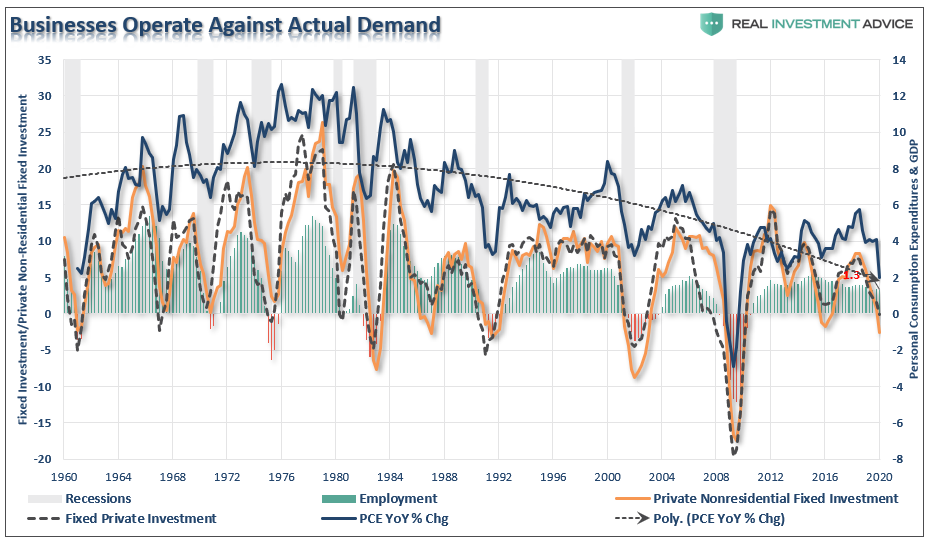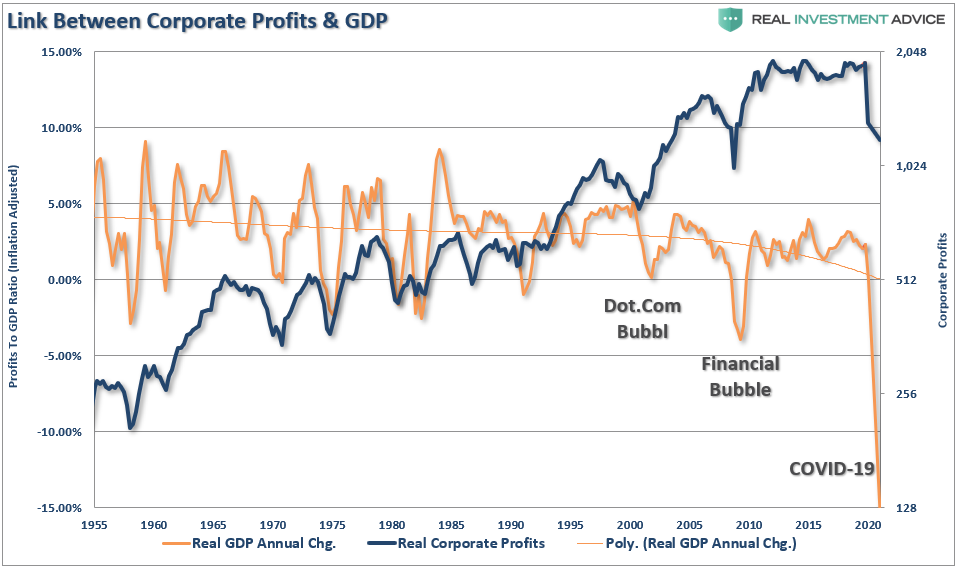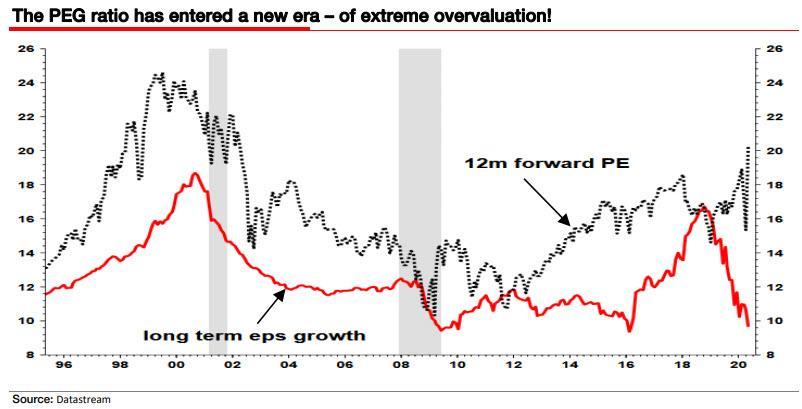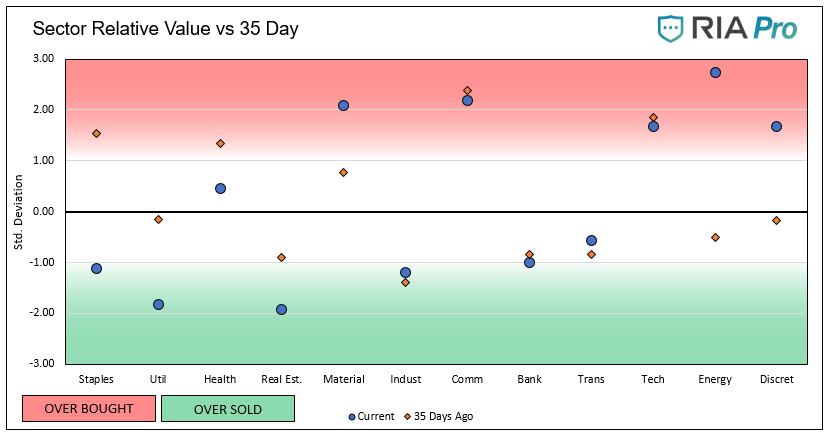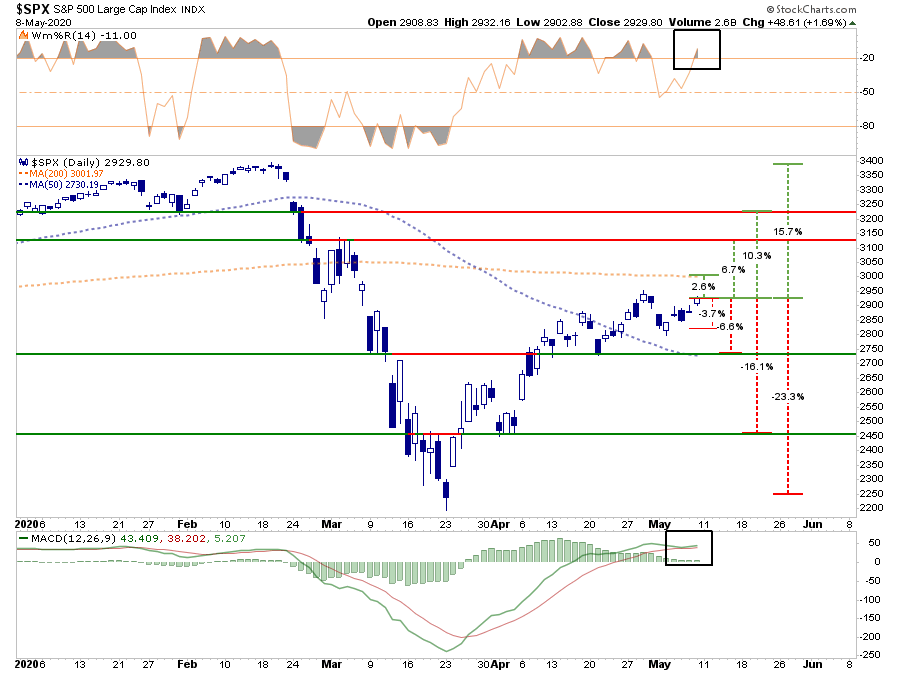Depressionary Economy Versus A Bull Market – Both Can’t Be Right!
Authored by Lance Roberts via RealInvestmentAdvice.com,
The Great Divide
There is currently a “Great Divide” happening between the near “depressionary” economy versus a surging bull market in equities. Given the relationship between the two, they both can’t be right.
Depressionary Economy
As noted by Jay Denton from Thinkwhy:
“April’s job loss was the worst on record, and a continued climb in unemployment is likely over the next few months. ThinkWhy believes the impact on the labor market was very front-loaded, and the month-to-month totals for job loss should begin to moderate in May.”
-
Non-farm payrolls decreased by 20.5 million in April
-
Labor force participation decreased to 60.2%
-
Leisure and Hospitality jobs took the brunt of job losses at -7.653 million
-
Combined February and March revisions were down by 214,000 jobs
-
32% of teenagers reported as unemployed
-
16.7% of Blacks and 18.9% of Hispanics reported as unemployed
-
Persons marginally attached to the labor force – those not in the labor force who currently want a job – numbered 2.3 million in April, up by 855,000 from last month
Here are a couple of charts for context to the magnitude of the decline.
Given the BEA will revise Q1-GDP towards -8%, and Q2 is estimated at nearly -20%, the unemployment rate of 14.7% will rise towards 20% in May’s report. These are numbers not seen since the “Great Depression,” and never seen in the official BEA data going back to 1948.
Labor Force Non-Participation
The participation in the labor force has dropped to levels not seen since 1973, and is a key measure to watch. Since the “Financial Crisis,” the participation in the “Labor Force” never significantly rose despite “record low unemployment rates.” Such is because the labor force was shrinking sharply over the last decade as more and more participants were simply “no longer counted.”
Those “Not In Labor Force” has surged sharply over the last month. These are individuals that are considered out of the labor force and no longer seeking employment.
Do you really believe that nearly 56% of the working-age population are no longer looking for work?
Wages Are Key
As we noted in our #MacroView below:
“The impact on the economy from record levels of unemployment is going to have a wide range of impacts which will forestall an economic recovery. The first, of course, is a deep suppression of wage growth, which comes from both recessionary drags and job losses.”
This data is just through the end of MARCH, with only two weeks of the shutdown accounted for. The decline in wage & salary disbursements with 20-million unemployed will far surpass the “Financial Crisis” lows in the April data.
Note the long-term trend in wages and salaries since 1980. Such is why we fail to attain higher rates of economic growth when it is 70% based on consumption.
There will be no “V-shaped” economic recovery.
Bull Market Ignores It All
The juxtaposition between economic data and the “bull market” in stocks is quite astonishing.
We tend to agree with BMO (Courtesy Of Zerohedge) on the underlying reasoning:
“Using this week’s price action thus far as a guide, the biggest drivers have been the reality of ballooning Treasury issuance which has steepened the curve and the specter of negative policy rates in 2021 that has led the belly to outperform while pushing 2-year yields to record lows.”
In other words, to no one’s real surprise, the driver of the market is simply “The Fed.” As the Fed engages in “QE,” it increases the “excess reserves” of banks. Since banks are NOT lending to consumers or businesses, that excess liquidity flows into the stock market.
As TPA noted on Friday for our RIAPro Subscribers (30-Day Risk-Free Trial)
“As bad as the economy is, stocks can only go lower if people sell and the subsequent liquidations take place. The asset management industry is overwhelmingly run by managers whose mandate is to remain invested in stocks.
There is over $100 trillion managed worldwide. The top 2 managers in the world are Blackrock and Vanguard. Blackrock manages most of the ETFs, and Vanguard is the largest index fund.”
Guess who runs the programs for the Federal Reserve and the Treasury? Blackrock.
If you want to chase risk currently, the advice is pretty simple.
So far, we have not seen massive liquidations and until we do, investment managers will do their jobs and stay invested in stocks. We are advising clients to keep a watchful eye trained for liquidations as a signal that the market will test new lows.” – TPA
Bull Market Vs. Depression Economy
Currently, the economic destruction is playing out in real-time with expectations it will quickly reverse. I highly suspect it won’t. As we noted last week:
“There is a negative feedback loop between employment and consumption. As unemployment rises, consumption falls due to a lack of income. Since businesses operate based on demand for goods and services, the correlation between PCE, fixed investment, and employment are high.”
“Despite the reopening of the economy, businesses will not immediately return to full operational activity, until consumption returns to more normal levels. Such a recovery is likely going to frustrate policy-makers and the Fed.”
It isn’t just the economic data that is going to be horrid over the next few months, but earnings will likely be just as bad. Earnings can not live in isolation from the economy. As shown below, corporate profits ebb and flow with economic activity.
It may not seem to matter at the moment as it’s all about “the Fed.” However, you shouldn’t dismiss the simple fact markets are deviated from long-term earnings. Historically, such deviations don’t work out well for overly “bullish” investors. (Chart courtesy of Albert Edwards via SocGen)
Just remember two simple rules:
-
So goes earnings, so goes the market.
-
Reversions happen fast.
Bull Market Rotation
What this all suggests is that “risk” still outweighs the potential “reward” of being aggressively invested in the markets. However, this DOES NOT mean you shouldn’t have exposure to the markets. It just means understanding how much risk you are undertaking.
This past week, we discussed our sector positioning in our portfolios and analysis of holdings with our RIAPro Clients (30-day RISK-FREE Trial).
-
“Currently, only two (Health Care and Transportation) of the eleven sectors are not in either oversold or overbought territory.
-
Technology (XLK) and Communications (XLC) remains relatively strong as they are perceived as shelter from the economic impact of the Corona Virus. (We stay overweight)
-
Energy (XLE) has been a favorite over the last two weeks and is now extremely overbought. We are comfortable with our stop loss and the sector is fundamentally cheap.
-
The Real Estate (XLRE) and Utility sectors (XLU) are relatively cheaper in part due to the recent slight increase in bond yields. (We have added to these areas)
-
Staples (XLP) are more appealing as a potential position add on. XLP has worked off its overbought condition and moved into oversold territory.
-
Discretionary (XLY) is approaching deeply overbought territory. We do not own XLY, as many of the underlying companies are very sensitive to the economic impact of the virus.“
Market Risk Still Outweighs Reward
While the market did rally this week back to the top of its ongoing consolidation range, the risk still outweighs the potential reward. We have updated the chart and ranges from last week.
With Friday’s advance, the risk/reward ranges remain unfavorable for now.
-
-3.7% to the 50% retracement vs. 2.6% to the 200-dma. Risk/reward negative.
-
-6.6% to the 50-dma vs. 6.7% to the March bounce peak. Risk/reward equally balanced.
-
-16.1% to the April 1st lows vs. 10.3% to January’s bottom. Risk/reward negative.
-
-23.3% to the March 23rd low vs. 15.7% to all-time highs: Risk/reward negative.
The risk of a downside retracement, as we head into summer months, outweighs the upside currently. Importantly, this does NOT mean the markets can’t rally to all-time highs. It is possible, just not probable, and as investors, we must weigh our outcomes.
While it may seem currently such a correction “can’t happen,” that is usually just about the time that it does.
Positioning Update
As noted above, we continue to take profits in trading positions, and as noted in our sector rotation analysis, continue to rebalance equities in areas that are outperforming. We continue to balance our equity exposure with offsetting hedges, and still maintain a larger than average level of cash.
There is only one thing I am sure of, a raging bull market in stocks can NOT co-exist with a depressionary economy for long.
The stock market is NOT the economy. But the economy is a reflection of the very thing that supports higher asset prices – corporate profits.
You do the math.
Tyler Durden
Sat, 05/09/2020 – 16:30
via ZeroHedge News https://ift.tt/2Wh8uaf Tyler Durden
